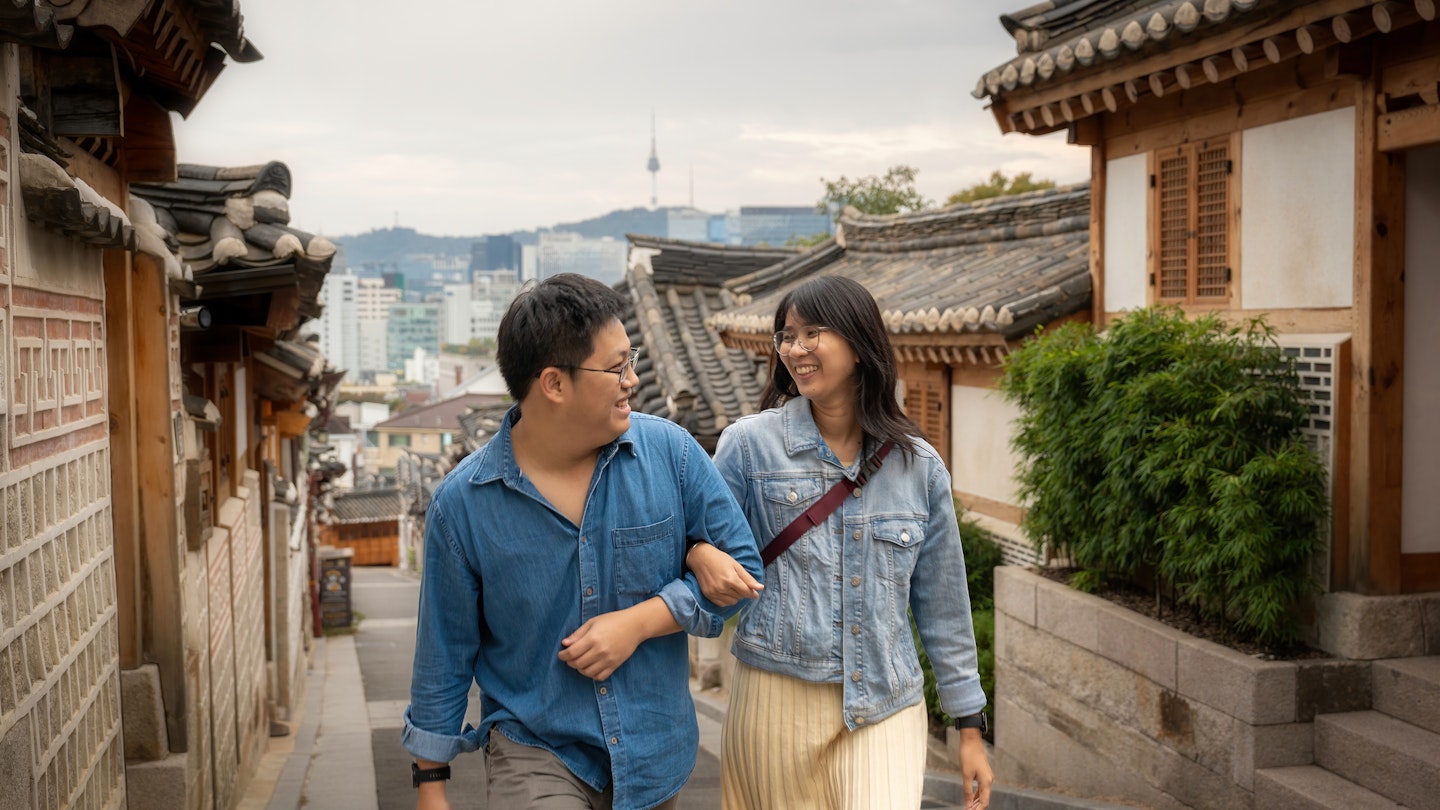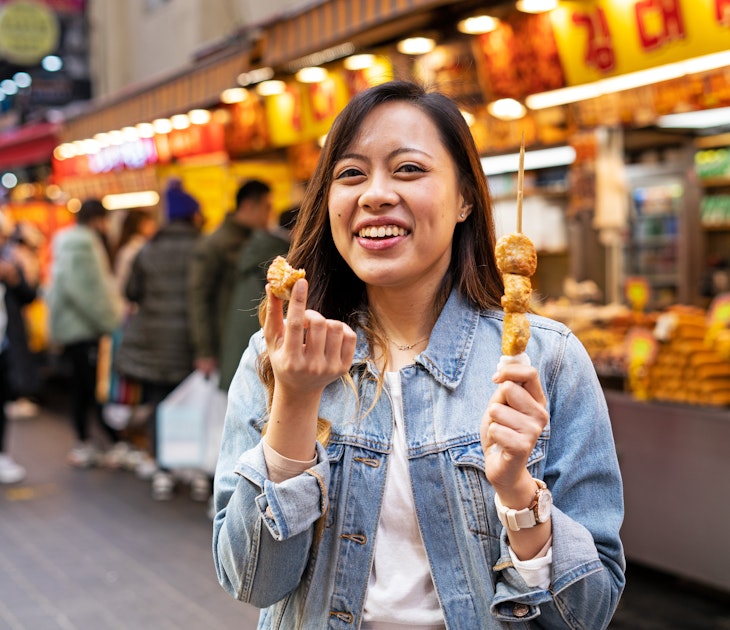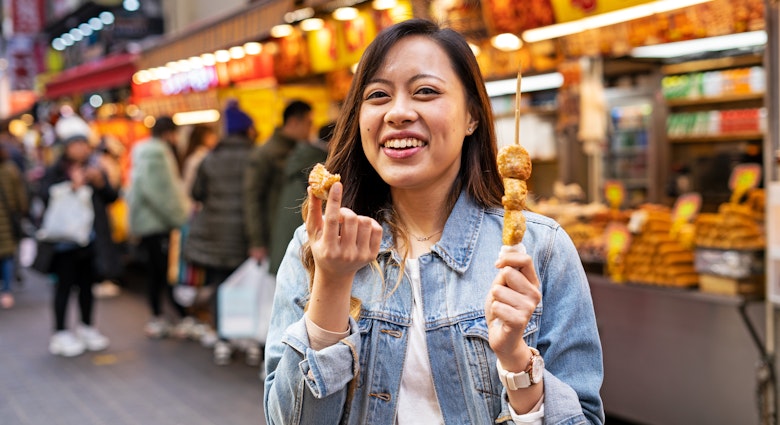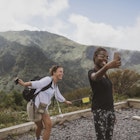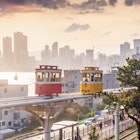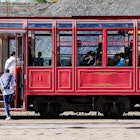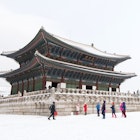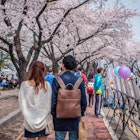Don't be alarmed by the tone of South Korean hits like Parasite and Squid Game: a visit to the capital city isn't synonymous with economic malaise.
But Seoul can indeed be stressfully expensive. With this guide to daily costs and money-saving tips, you won't be dropping millions of won at glittering nightclubs and five-star restaurants, but you will get to experience the best that the city has to offer. Here's how to have a fabulous trip to Seoul on a budget.
Daily costs in Seoul
Dorm bed in a hostel: ₩20,000–₩40,000
Basic room for two: from ₩80,000
Self-catering apartment (including Airbnb): from ₩100,000
Hanok (traditional Korean house) stays: from ₩120,000
Public transport ticket (one subway ride): ₩1400
Coffee: ₩5000
Gimbap (Korean sesame-oil-flavored rice wrapped in seaweed): ₩4000
Dinner for two: from ₩30,000
Beer at the bar: from ₩5000
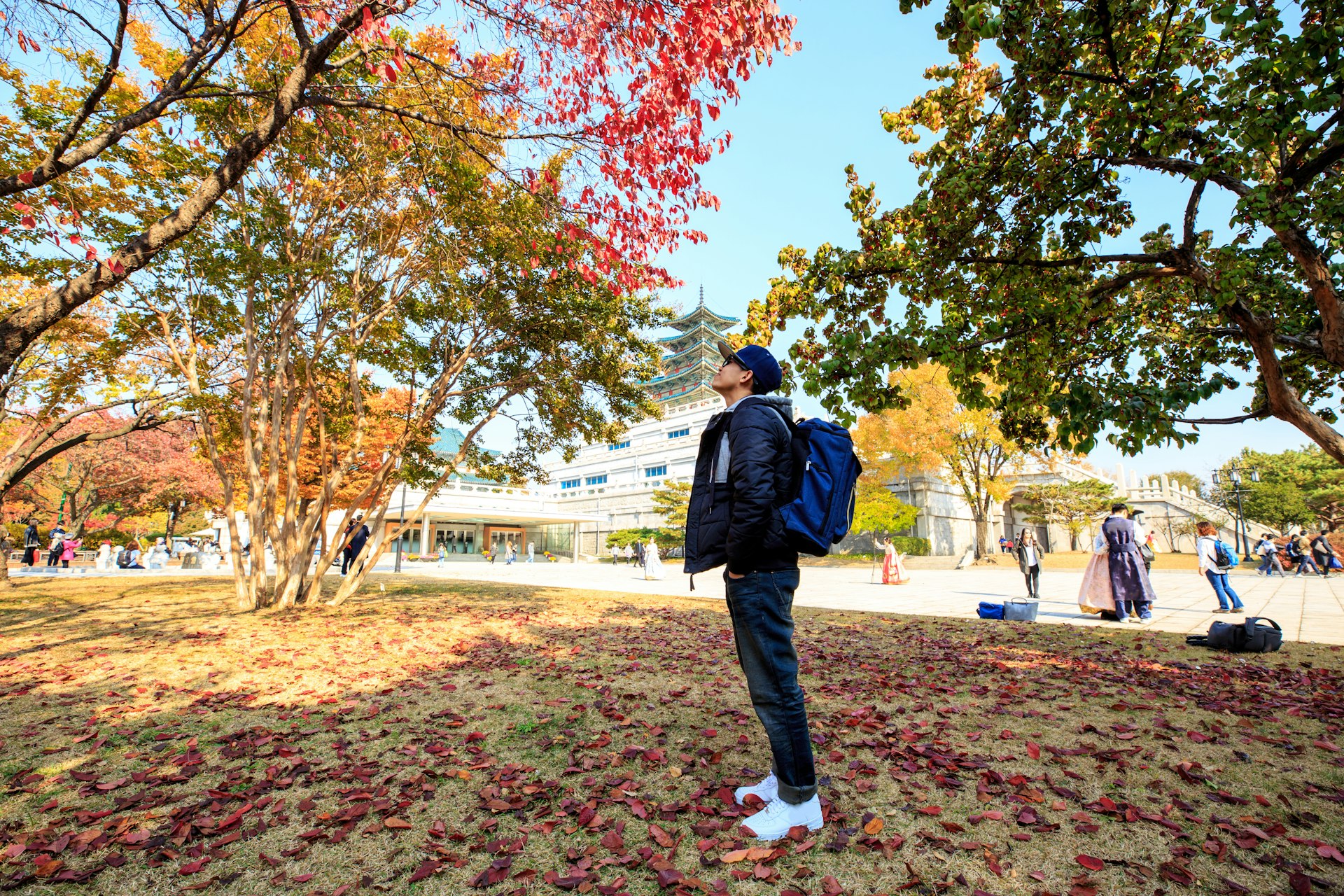
Visit in the fall
Visiting Seoul at the right time can help your bottom line. June, July and August are South Korea's high season for travel, with hotels and airfare anywhere from 10% to 25% more expensive than in the off seasons. Visiting during winter or spring can be equally cost-effective, but the bitter cold of the former means you won't be able to enjoy many free outdoor activities, while the latter coincides with yellow dust season (when desert sand and industrial pollutants blow in from China, Mongolia and Kazakhstan).
Not only is fall generally considered Korea's most beautiful season, but it's also the perfect time of year to take advantage of hiking in one of the country's many mountains (more than 70% of South Korea is mountainous) and attending free festivals in the capital.
Take advantage of Culture Day
The last Wednesday of every month is designated as Culture Day, which means discounts or free admission to some 2000 cultural activities and attractions across South Korea. Both locals and visitors can take advantage of, say, discounted tickets to the Coex Aquarium, free entrance to the royal palace of Gyeongbokgung and movie theater tickets priced at ₩5000.
Focus on Seoul's neighborhoods instead of its attractions
Just about any visitor to Seoul will tell you that the best experiences in the city involve narrow alleyways, vibrant neighborhoods and independent cafes. While popular tourist attractions like the N Seoul Tower and Lotte World can delight, the admission fees will add up. Your time – and your won – is usually better spent getting to know neighborhoods.
Start by adding explorations of Bukchon Hanok Village, Euljiro and Seongsu-dong to your itinerary: Bukchon Hanok Village is Seoul's most scenic and historic quarter, while the other two offer glimpses into more contemporary Seoul life. Each of these neighborhoods tells a story, and you could easily spend many days taking in their architecture, streetscapes and ambiance.

Beware of nighttime surcharges on taxi fares
Because the Seoul Metro doesn't operate from midnight to 5:30am, many people rely on taxis to take them home, and cab fares are subject to a hefty surcharge after 10pm. For most of the day, Seoul cab costs are calculated by a combination of a base fare of ₩4800 for the first 2km (1.24 miles) plus ₩100 for each additional increment of 131m (430ft). However, from 10 to 11pm and 2 to 4am, that base fare increases to ₩5800; from 11pm to 2am, it is ₩6700.
Keep in mind that buses run every hour or so through the night depending on where you're staying; if you plan on being out late, it will pay to get familiar with the evening bus schedule.
Look into the Discover Seoul Pass
The Discover Seoul Pass offers free or discounted rates for many of the city's attractions and methods of transportation. To decide whether the pass is cost-effective for you, make a list of all you'd like to do. If you are interested in major attractions like Lotte World, the 63 Building and N Seoul Tower, it may be well worth it – though some of the attractions included are already low-cost or completely free.
The pass is available in increments of 24, 48 and 72 hours and includes use of the AREX (the train from Incheon Airport to Seoul), Seoul Bike (the city's bike-share system) and limited traveler's insurance.
Claim your tax refund
In South Korea, all prices include a 10% sales tax – a tax that is refundable for all tourists purchasing any item between ₩30,000 and ₩500,000. To claim the money, simply show your receipt and passport at a tax-refund kiosk either in the store or at Incheon Airport. Many tourists prefer the latter as airport workers typically speak English well and are familiar with the process.
While many stores participate in the tax-free system, not all of them do: look out for a sticker at the entrance or ask a store manager. Be aware that you can't redeem cash for more than ₩2 million worth of receipts.
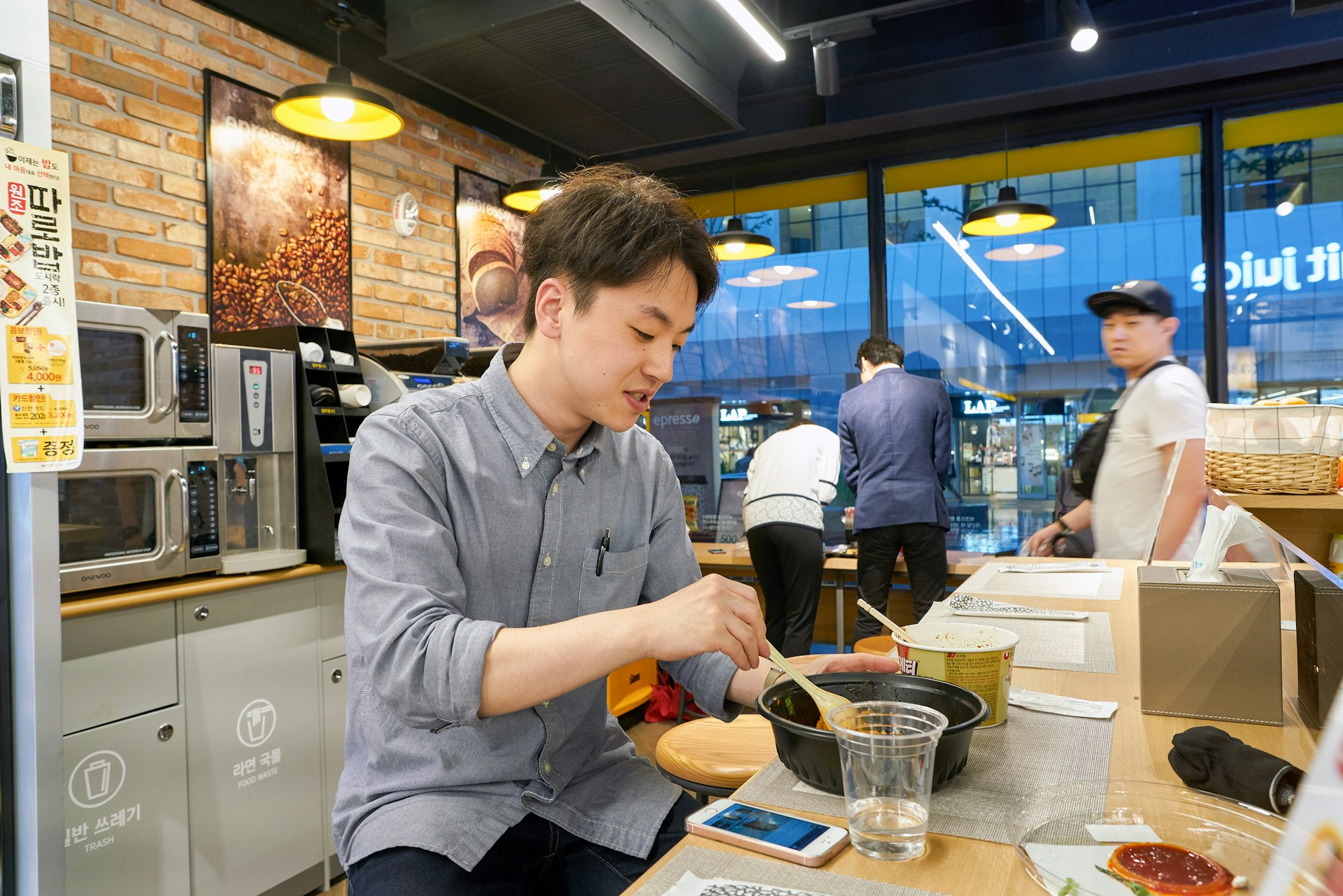
Budget shoppers love South Korea's convenience stores
Stocked with everything from packaged meals to facial cleansers and socks, South Korean convenience stores are every budget traveler's best friend. You can find them on practically every street corner in Seoul.
Most convenience stores stock at least a handful of vegetarian or vegan-friendly snacks and offer two or three seats for eating in. So, if you find yourself in an upscale neighborhood with few budget restaurant options, a quick bite at a convenience store is always a helpful backup.
If you're headed to a nightclub and don't want to pay ₩15,000 (US$12.50) for vodka sodas all night, sneak to the nearest convenience store to stock up on drinks. With everything from soju to craft beers, imported wines and top-shelf liquor available at a fraction of the cost of clubs, don't be surprised to find fellow savvy party-goers in line with you to check out.
Eat like a local at baekban, markets and low-cost restaurants
With the rising international popularity of Korean barbecue, visitors to the country often assume heavy meat dinners are the norm here. On the contrary, indulgent barbecue – especially with beef – is still considered a luxury. Save the gas-stove feast for a special occasion, and seek out more typical cuisine instead.
Baekban (Korean home-style cooking) restaurants serve rice with one main and a few side dishes for lunch, while hole-in-the-wall stew joints offer dinners under ₩30,000. At Seoul's traditional markets, you can find generous portions of Korean-style noodles for less than ₩10,000.
Map out where to stay based on your needs
The right neighborhood for you will depend on how long you're staying and what you're looking for from your trip. If you're in town for only a few days, look for accommodations in Jongno or Euljiro. These corners of downtown Seoul are cheaper than Myeong-dong or Gwanghwamun, and you'll still be able to walk to most of the city's top tourist destinations.
If going out at night is a major priority, stay in Itaewon, where you can walk to the city's hottest clubs instead of spending on cab fare. If you're in town for an extended vacation, look into college neighborhoods like Sinchon or Hongdae, which cater to short-term stays for exchange students. Restaurants, cafes and even grocery stores here are typically cheaper than in Gangnam, a hub for business travelers.
Carry cash
Although you can use your credit card at most establishments, some mom-and-pop shops and independent clothing boutiques may charge you a ₩1000 credit card fee. Cash can also come in handy when shopping at traditional markets, as vendors are more open to negotiating prices with paper money.
